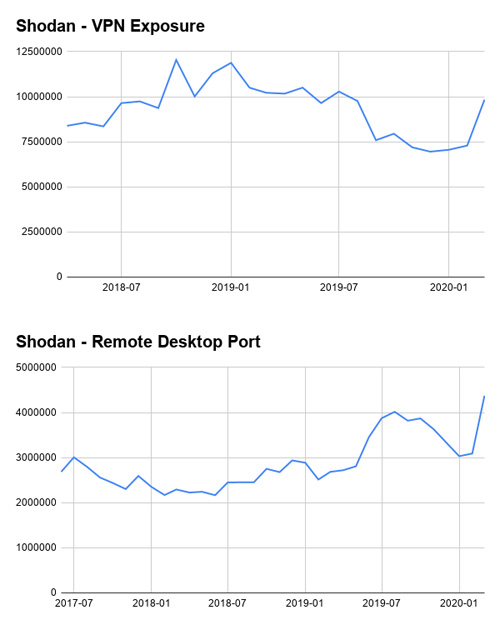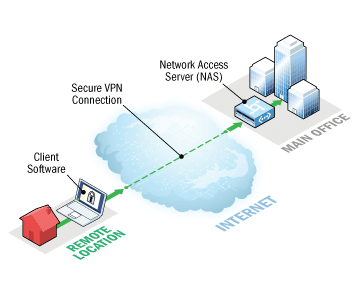The use of remote access technologies like VPN (Virtual Private Network) has skyrocketed 33% since the coronavirus (COVID-19) outbreak.
This happened as more and more companies are asking their employees to work from home and away from the traditional office setting.
With more people urged to work from their homes, they usually rely on VPNs to connect to their companies' internal intranets with secure remote access.
Shodan, the search engine that scans and indexes Internet-connected devices instead of websites, reported that the number of various servers running VPN protocols like IKE and PPTP has gone up by a third, from 7.5 million systems, to almost 10 million.
The number of RDP (Remote Desktop Protocol) endpoints has also gone up from roughly 3 million recorded at the start of the year to almost 4.4 million on Sunday, March 29, 2020.

ExpressVPN for example, experienced the average global usage of its service to increase by 21% with double-digit growth occurring in Europe and North America.
In Europe, Belgium and France saw the highest growth rates at 43 and 34% respectively, but VPN usage is up across the region as employees working remotely are using VPNs to protect themselves online or to securely access their companies' networks. And in North America, the U.S. led with 26% followed by Canada (24%) and Mexico (18%).
ExpressVPN also revealed that until this date, the Asia Pacific region has seen the least amount of growth if compared to regions in the West.
Consumer-grade VPNs have also reported a similar spike in usage numbers, with most of their users are people who are quarantined by their respective governments.
NordVPN for example, said that it experienced 165% rise in users since March 11, while Atlas VPN reported a 124% surge in VPN use among its U.S. users.
While these numbers may rely on third-party monitoring, meaning that they may not be that accurate, but by seeing that they all have experienced a surge, it can be concluded that the shift in how people work do affect VPN usage around the globe.
Read: Explaining The Types Of VPN Services And The Protocols They Use
The VPN business in the tech industry is often overlooked. But as it turns out, the business is booming in incidents like the coronavirus, where companies in many industries are bracing for the worst impact of the virus.
With more of their employees working remotely from home, companies are scrambling to purchase and implement VPN tools.
Amazon for example, is reportedly asking all employees to test their VPN connection on Thursday by logging in remotely for at least 10 minutes.
With VPN, users of the technology can create a secure tunnel to connect their devices with their companies' corporate network. It's using this tunnel that communications and data are sent encrypted, preventing third-parties like hackers and government surveillance programs to eavesdrop on the sensitive information.

While most of the communications can be done using video-conference apps, but VPNs are still the preferred ways for a more secured communication. Many organizations still rely on VPNs to grant employees access to applications even though many of their apps run in the cloud.
Seeing this surge benefiting them, some VPN providers want to give back to the community.
Check Point for example, quietly started offering companies free 60-days licenses to its VPN tools. Within days, the company received interest from several hundred companies, said Maya Levine, a security engineer at Check Point.
"We realized there's going to be a huge surge in people wanting to work from home, and we wanted to help businesses in this transition period," Levine said, suggesting that the decision was made out of the company's goodwill.
Another example is Pulse Security, a major provider of remote access technology, that also offers temporary licenses to new customers, and has given existing clients emergency increases in capacity.